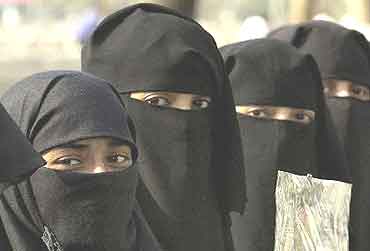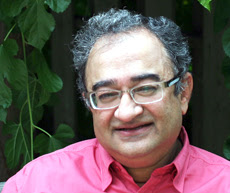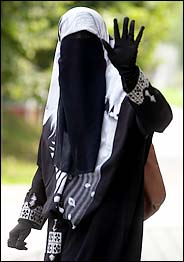November 04, 2006
Pakistani Judge tells veil wearing lawyer to take it off
Friends,
In Pakistan's North West Frontier Province, a coalition of Islamist political parties governs the province. In the provincial legislature, a dozen or more women MPs sit in a cluster, covered from head to toe in black burkas, making the speaker's job almost impossible.
No one knows who is behind the burqas as it is not permitted to check the identities of these MPs. Imagine this in the House of Commons in Ottawa or the US Senate. Imagine the speaker not being able to know who said what or whether the person sitting in Belinda Stronach's chair is Belinda herself or Peter McKay!
The problem of the burka is compounded in the courts, where some lawyers are appearing in veils and the judges cannot see who they are talking to. This came to a head yesterday when the Chief Justice of the Peshawar High Court ordered a woman lawyer to take off her niqaab so he could see her and hear her. Here is a report of this incident from the Pakistani newspaper, The Times.
Read and reflect.
Tarek
------------ --------- --------- -----
Saturday, November 04, 2006
Pakistan Chief Justice
says no to veiled lawyers
By Akhtar Amin
Daily Times, Pakistan
PESHAWAR, Pakistan - Peshawar High Court (PHC) Chief Justice Tariq Pervaiz Khan has ordered women lawyers not to wear veils in courtrooms, saying they (the women lawyers) could neither be identified nor assist the court well in veils. “You (women lawyers) are professionals.
You should be dressed as requisite for the lawyers. We (the judges) cannot identify women lawyers wearing veils and doubt that veiled lawyers appear in court several times seeking adjournments for other lawyers’ cases,” Justice Pervaiz told a veiled lawyer, Raees Anjum, who was seeking adjournment of a case.
The court could barely hear Ms Anjum’s name when she was asked to make her presence for a case she was seeking an adjournment for. Ms Anjum had to repeat her name several times because of her veil and this led to the chief justice’s observation that women lawyers should not wear veils in courtrooms.
“I was embarrassed when the chief justice asked me not to wear a veil in the courtroom,” Ms Anjum told Daily Times. “I feel more confident in my hijab (veil). I am a progressive Muslim woman who has the courage to follow her faith while living and working in this conservative society.... hijab reflects a woman’s modesty,” she said.
She added that several women judges in the NWFP (Pakistan's province bordering Afghanistan) wear a veil and all MMA (Islamist allaince ruling the province) women MPs are also veiled. Ms Anjum told Daily Times that there was a difference of opinion in the judiciary on the issue.
“On one hand, Peshawar Sessions Judge Hayat Ali Shah tells women lawyers to wear veils when coming to his court, while the PHC chief justice wants women lawyers appearing in court without veils.”
November 02, 2006
German Muslim MP urges her sisters: "Wake up to today's Germany. This is where you live, so take off your veils"
 November 2, 2006
November 2, 2006 German Politicians Rally around Muslim Lawmaker in Headscarf Row
Politicians from across the spectrum have expressed solidarity with a Green Party parliamentarian of Turkish origin who has received death threats after urging Muslim women in Germany to take off their headscarves.
Elkin Deligöz' comments in a newspaper article two weeks ago sparked not just a deluge of criticism by religious leaders and the media in Turkey but also intimidation. The Green Party parliamentarian has received death threats and is now under police protection.
The incident has, although somewhat belatedly, led to a slew of German politicians -- ranging from her fellow left-wing party members to lawmakers from the center-right -- to express their support and defend her right to speak her mind.
Freedom of expression must be protected, said German Interior Minister Wolfgang Schäuble. "It's not OK when someone is threatened" for exercising that right. He called on politicians to do everything they could to throw their weight behind Deligöz.
The Green Party's co-leader in parliament, Renate Künast, has already complained to Turkey's ambassador in Berlin of "unacceptable" reactions in Turkish media to Deligöz' comments.
Newspapers in Turkey had called Deligöz a "Turkish Nazi" and a "disgrace to mankind."
Meeting with Islamic groups
Künast invited several Islamic organizations for discussions on Tuesday, including the Islamic Council, the Turkish Association of Berlin and Brandenburg and the Turkish-Islamic Union for Religious Affairs. Several representatives stressed that they did not agree with Deligöz' opinion, but condemned the threats she had received.
"What she said is nonsense to me," said chairman of the Turkish Community in Germany, Kenan Kolat. But he added that it was important that "she is allowed to spread this nonsense."
Deligöz, who was born in Turkey but grew up in Germany, addressed Muslim women living in Germany in a newspaper article recently, saying: "Wake up to today's Germany. This is where you live, so take off your veils."
After the meeting on Tuesday, Deligöz stressed that she would not allow herself to be intimidated, and that she stood by her opinion on headscarves in Germany.
"I am going to live my life from now on just as I have up to now," she said. "I stand by my comments and I have no reason to deviate from them whatsoever."
Integration of Germany's Muslim population has been a hot-button issue in Germany for some time. It has become a priority for Chancellor Angela Merkel's government as concern grows about Islamic radicalisation across Europe and the emergence of an underclass of disillusioned young Muslims in the country, who are mostly Turks.
Recent moves by a theater in Berlin to cancel a opera that featured the severing of the heads of religious figures, including that of Prophet Mohammed, for fear of Islamist attacks was strongly condemned by politicians. Though the opera has since been reinstated, the incident has served to underline the growing debate on freedom of speech in Europe and whether it should have limits when it comes to offending religious sensibilities.
Support from the right
Wolfgang Bosbach, deputy head of the conservative Christian Democratic parliamentary group, called on Germany and its leaders to "show some backbone."
"She (Deligöz) has earned the unconditional support of all of civilized society," he told the broadcaster n-tv.
November 01, 2006
India's leading Muslim cleric, the Imam of New Delhi's Jama Mosque, describes Shabana Azmi as a Prostitute
 November 1, 2006
November 1, 2006The Shabana Azmi Controversy:
Leading Indian Imam refers to her as the 'Naachne Gaane Waali Aurat'
Outlook India
So what's the song and dance all about? Why is that instead of being felicitated for the honour bestowed on her, Shabana Azmi finds herself in the middle of a controversy? What did she really say about the veil? And what are her critics going on about?
It was a moment of glory for Shabana Azmi as she became the first Indian recipient of the prestigious International Gandhi Peace Prize, after such luminaries in the past as the Dalai Lama and Archbishop Desmond Tutu.
"I am truly overwhelmed and humbled to receive the covetous award. My joy on this occasion has been doubled because Vanessa Redgrave, who has been my hero for many years, both as an actress of immeasurable talent and a woman of tremendous courage who has stuck her neck out of for her political convictions and issues of human rights and social justice, has consented to give me the Award," she had said in her acceptance speech at the House of Commons in London.
"Terrorism is being equated with Islam," she had pointed out: "This is both unjust and untrue. Myths are being perpetuated in the name of religion. Islam resides in more than 50 countries in the world and takes on the culture of the country in which it resides. So it is tolerant in some, liberal in some, extremist in others".
"The fight today cannot be between the Christian and the Muslim, the fight cannot be between the Hindu and the Muslim—the fight needs to be between ideologies—the ideologies of the liberal versus the ideologies of the extremist. The liberal Muslim, Christian, Hindu on the same side against the extremist Muslim, Christian, Hindu on the other," Azmi said in her Gandhi Memorial Lecture 'Non-Violence Is Possible'.
She also spoke on the condition of women in India: "It is true that in India, women on one hand are moving from strength to strength, on the other we also have to confront the horrific violence of female foeticide. It is ironic that a country that worships its women as goddesses also devalues its girl child - denies her access to equal opportunity and is even denying her the right to life. We must put an end to this violence now."
But that was not all. She was confronted with a question on the current veil controversy raging in Britain, and her answer was very simple:
"The Quran speaks about women wearing clothes to cover her modesty. A woman is supposed to cover herself to be modest. She does not need to cover her face. A time has come for a debate on the issue"
Later, in India, when asked to clarify what exactly her views were, she said that while she thinks that the Koran does not explicitly ask women to cover their faces, and they should not be forced to do so as it prevents social interaction and hampers communication, and that Muslims too need to evolve with the times and adapt given the context and situation.
She stressed that for many people, wearing the veil could even be a way of protest against the British policies post-9/11 and that many may just want to make a point of asserting their distinct religious identity. She also took pains to point out that for her issue was that a compulsion of any kind should not be allowed, that no one should be compelled to wear or not wear a veil, and that in addition remarks such as Jack Straw's would make even her to want to cover her face not under one but three veils, just to register her protest.
But she once again reiterated that the time has come for Muslims to debate the issue seriously. Instead of a debate, what followed were usual personal attacks. The first to lead the charge was the Shahi Imam of Jama Masjid, New Delhi, and others including the general secretary of the highly influential Jamiat Ulema-e-Hind followed suit. Prominent Shia clerics and well-known liberals such as Arif Mohammed Khan and Syeda Hameed have spoken out in her favour. A sampling of some of the soundbytes:
Syed Ahmed Bukhari, Imam, Jama Masjid, New Delhi: "Who has authorized Shabana Azmi to interpret the Quran? She is not a Muslim, she is just a 'naachne gaane waali aurat' — a woman who sings and dances — and she should confine herself to her profession and must not speak on things she has no knowledge about. She does not represent the mainstream views within the community. If there is no controversy on Christian nuns wearing a habit, so why should people look for controversy over a Muslim woman wearing a veil? The Quran clearly instructs Muslim women to wear a veil, though it is always up to the followers of any religion how sincerely they follow its principles. Many of our Muslim brethren do take alcohol. But this conduct of theirs does not refute the fact that taking any type of intoxicant is forbidden in Islam. If a woman chooses to move out without a burqa, it would be considered against the tenets of Islam."
Kalbe Sadiq, All India Muslim Personal Law Board: "The Quran only says that the head of a woman and a bit of her face should be covered. There is no need to cover the whole face. There is no mention of the "Talbani purdah" in the Koran. Islam is against the head-to-toe coverings imposed by the Taliban in Afghanistan. The Surah Noor from the Quran demands of a man not to look at the face of a woman and asks him to lower his gaze to protect her modesty."
Khalid Rasheed, Firangimahali, All India Muslim Personal Law Board: "It has become a fashion for some Indian Muslims to criticize the teachings of the holy Quran."
Maulana Mahmood Madani, Rajya Sabha member and general secretary, Jamiat Ulema-e-Hind: "Only Islamic scholars can speak on such issues, Azmi has received no Islamic education, it's only proper for Muslim women to wear veil, what she has said is an offence against Islam. She is talking about a sensitive issue without authority."
Arif Mohammad Khan, former Union minister, BJP: "Islam is against compelling mankind against their will. Islam is against imposition of norms and attitudes. It only expects men and women to dress decently and not to provoke lewdness."
Syeda Hameed, member, Planning Commission: "The modesty code in Islam applies equally to men and women. Islam does not compel women to cover their faces, They are unnecessarily raising a controversy. The clamour against Shabana is an _expression of male bias. Nobody bothers about the Koranic injunctions on how to dress for men. It's ridiculous, women should speak out."
Liberals find much merit in Syeda Hameed's argument that despite there being explicit injunctions on the male way of dressing too, no one seems to be interested in enforcing any dress-code on such well-known Muslim men as any of the Mumbai film industry Khans or sportsmen, but Tennis star Sania Mirza's sporting gear was picked on, just as Shabana Azmi's call for a debate has been sensationalised. It is clear, they point out, that the patriarchal clergy is fighting a desperate battle against modernity's evolutionary onslaught.
In India, so far, any sort of a compulsion has always been frowned upon, even in Kashmir, as Dukhtaran-e-Millat had found out when it tried to enforce a compulsory Talibanesque purdah on the women in the valley. There were not many takers, despite threats of serious bodily harm. Elsewhere in India too, it has been well-established that the veil has more to do with cultural or regional, and less with religious, dimensions.
The traditional ghungat among the Hindu women in Rajasthan and elsewhere, or the non-observance of purdah by many Muslim women, which hardly ever elicits a comment, makes this abundantly clear.
But with Shabana Azmi's intervention, it is clear that the debate over the compulsory veil for the Muslim women has come out of the purdah.




